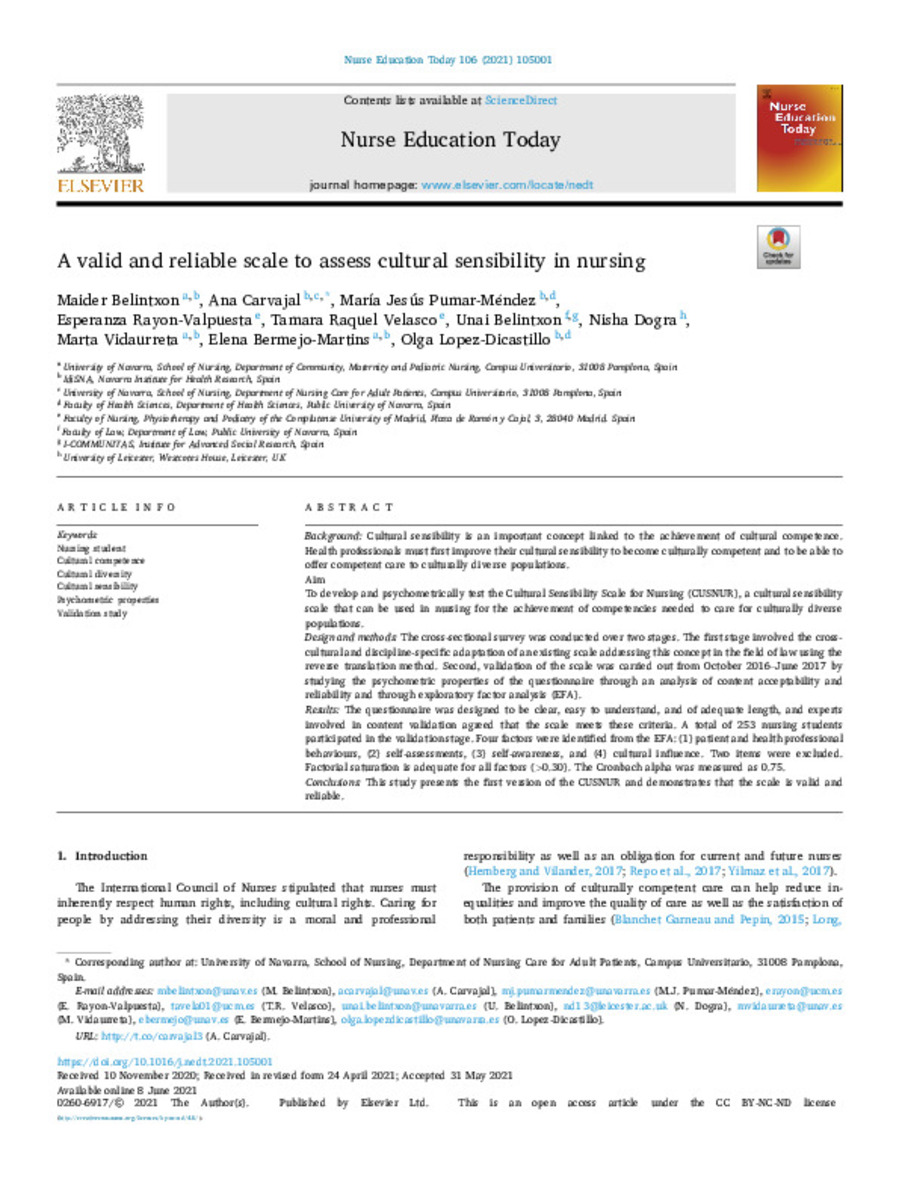Registro completo de metadatos
| Campo DC | Valor | Lengua/Idioma |
|---|---|---|
| dc.creator | Belintxon, M. (Maider) | - |
| dc.creator | Carvajal, A. (Ana) | - |
| dc.creator | Pumar-Mendez, M.J. (María Jesús) | - |
| dc.creator | Rayón-Valpuesta, P (Pedro) | - |
| dc.creator | Raquel | - |
| dc.creator | Belintxon, U. (Unai) | - |
| dc.creator | Dogra, N. (Nisha) | - |
| dc.creator | Vidaurreta, M. (Marta) | - |
| dc.creator | Bermejo-Martins, E. (Elena) | - |
| dc.creator | Lopez-Dicastillo, O. (Olga) | - |
| dc.date.accessioned | 2022-04-05T10:25:15Z | - |
| dc.date.available | 2022-04-05T10:25:15Z | - |
| dc.date.issued | 2021 | - |
| dc.identifier.citation | Belintxon, M. (Maider); Carvajal, A. (Ana); Pumar-Mendez, M.J. (María Jesús); et al. "A valid and reliable scale to assess cultural sensibility in nursing". Nurse Education Today. 106, 2021, 105001 | es |
| dc.identifier.issn | 0260-6917 | - |
| dc.identifier.uri | https://hdl.handle.net/10171/63345 | - |
| dc.description.abstract | Background: Cultural sensibility is an important concept linked to the achievement of cultural competence. Health professionals must first improve their cultural sensibility to become culturally competent and to be able to offer competent care to culturally diverse populations. Aim To develop and psychometrically test the Cultural Sensibility Scale for Nursing (CUSNUR), a cultural sensibility scale that can be used in nursing for the achievement of competencies needed to care for culturally diverse populations. Design and methods: The cross-sectional survey was conducted over two stages. The first stage involved the cross- cultural and discipline-specific adaptation of an existing scale addressing this concept in the field of law using the reverse translation method. Second, validation of the scale was carried out from October 2016–June 2017 by studying the psychometric properties of the questionnaire through an analysis of content acceptability and reliability and through exploratory factor analysis (EFA). Results: The questionnaire was designed to be clear, easy to understand, and of adequate length, and experts involved in content validation agreed that the scale meets these criteria. A total of 253 nursing students participated in the validation stage. Four factors were identified from the EFA: (1) patient and health professional behaviours, (2) self-assessments, (3) self-awareness, and (4) cultural influence. Two items were excluded. Factorial saturation is adequate for all factors (>0.30). The Cronbach alpha was measured as 0.75. Conclusions: This study presents the first version of the CUSNUR and demonstrates that the scale is valid and reliable. | es_ES |
| dc.language.iso | eng | es_ES |
| dc.rights | info:eu-repo/semantics/openAccess | es_ES |
| dc.subject | Cultural competence | es_ES |
| dc.subject | Cultural diversity | es_ES |
| dc.subject | Cultural sensibility | es_ES |
| dc.subject | Nursing student | es_ES |
| dc.subject | Psychometric properties | es_ES |
| dc.subject | Validation study | es_ES |
| dc.title | A valid and reliable scale to assess cultural sensibility in nursing | es_ES |
| dc.type | info:eu-repo/semantics/article | es_ES |
| dc.description.note | This is an open access article under the CC BY-NC-ND license | es_ES |
| dc.identifier.doi | 10.1016/j.nedt.2021.105001 | - |
| dadun.citation.publicationName | Nurse Education Today | es_ES |
| dadun.citation.startingPage | 105001 | es_ES |
| dadun.citation.volume | 106 | es_ES |
Ficheros en este ítem:
Estadísticas e impacto
Los ítems de Dadun están protegidos por copyright, con todos los derechos reservados, a menos que se indique lo contrario.






